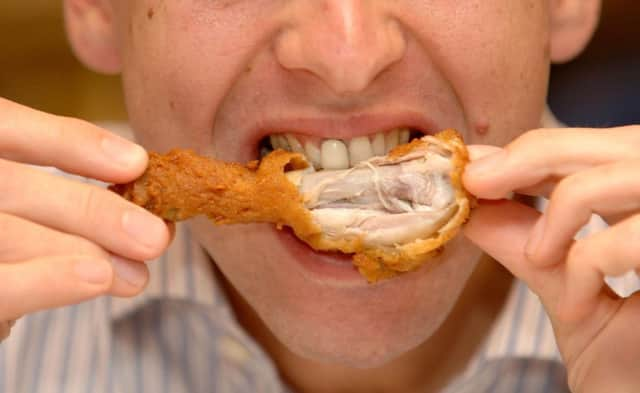FIRST AID: Food poisoning


Food poisoning is caused by eating contaminated food. In most cases the food hasn’t been cooked properly and is contaminated by bacteria such as salmonella or Escherichia coli (E-coli), which are found mainly in meat. Bacteria may also be spread directly from person to person through poor hygiene and poor handwashing.
Someone may feel the effects of food poisoning within a few hours, and will often be sick or have diarrhoea. However, in some cases the effects can take a few days.
Advertisement
Hide AdAdvertisement
Hide AdThe effects of food poisoning can make someone feel extremely ill. The most important thing is to keep encouraging the person to drink fluids so they don’t become dehydrated. Dehydration can make some people extremely unwell.
Most people recover from food poisoning without needing any medical treatment but if they are unwell seek medical advice.
If you think someone may have food poisoning, these are the five key things you may find:
•They may feel sick/be vomiting
•Have stomach cramps
•Have diarrhoea
•Complain of headache or fever
What you need to do:
•If you think someone has food poisoning, advise them to lie down and rest
Advertisement
Hide AdAdvertisement
Hide Ad•Give them water or unsweetened fruit juice to drink, even if they are vomiting and can only manage regular small sips. A bowl or bucket may be handy in case they are sick.
•If they have diarrhoea, it’s even more important they try to replace lost fluids and salts
•Give them water, but oral rehydration solution will help to replace water as well as salt and other minerals which they’ve lost through diarrhoea and vomiting. It is widely available and usually comes as a powder which is dissolved in water
•When they feel hungry again, advise them to eat easily-digested foods, such as pasta, bread and potatoes especially on the first day. If tolerated, then they can attempt a ‘normal diet’
Advertisement
Hide AdAdvertisement
Hide Ad•If the person gets worse (the vomiting and diarrhoea is persistent), they are elderly or a young child, seek medical advice or if necessary call 999 or 112 for emergency medical help.
•It is best not to take anti-diarrhoea medicines unless specifically advised to by a healthcare professional.
•To prevent the spread of the infection, always use and encourage good hand hygiene.
The St John Ambulance app is available free on smartphones and the website (sja.org.uk) offers demo videos, an interactive game, and lots of free advice. For more information about first aid courses please call 0303 003 0101.